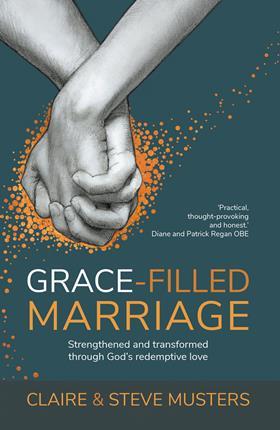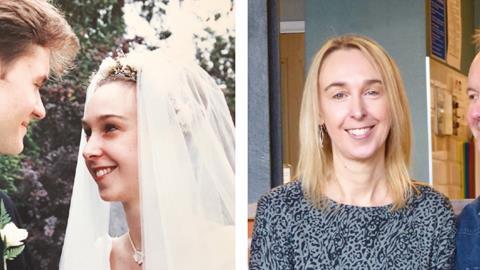After a period of separation, Claire and Steve Musters were determined to make their marriage work. During a time of rebuilding, they were challenged by their marriage counsellors to think back to what drew them together in the first place. They realised many of their ideas about marriage had been fuelled by cultural rather than biblical ideals – and they don’t think they are the only ones…
Claire: We had married young, having met at church youth group. To everyone else, we looked like we had the perfect set-up: settled with our ‘childhood sweetheart’ and both doing jobs we loved (me in publishing and Steve as a record producer). And yet, the first decade of our marriage was dysfunctional.
Like many others, we had grown up in church, lapping up the message that tends to be touted: marriage is the ideal to aim for. But, as our wedding date grew closer, I remember my mum trying to talk to me about the difficulties she could already see emerging in our relationship, due to Steve’s long hours as an apprentice in a recording studio. I simply shrugged her remarks off, saying: “It’s too late now. I fell in love with him years ago.”
I had walked down the aisle as a 20-year-old romantic, completely uninformed about what marriage truly was. Somehow, as Christians, we can assume that with God in our marriage we can have the perfect relationship. We forget that we are navigating life as two ‘works in progress’.
IN SURVIVAL MODE
Steve would work around the clock, often seven days a week. When he did have time at home he simply crashed, exhausted. I became deeply saddened that our experience of marriage was not what we had hoped for.
Once or twice a year, I would have a meltdown and say that I couldn’t go on. As neither of us really knew what to do about it, I would eventually stop shouting and we would simply put our heads down once more and get on with life as it was.
I got more and more heartbroken. I felt like it wasn’t the life I had signed up for, but I couldn’t see a way out. That was, until a friend started to open up to me. He understood how I was feeling, because he was feeling the same in his own marriage. I was so relieved to be able to connect with someone who really understood me, that I didn’t realise how emotionally invested I became in our relationship. Then one day he told me he was leaving his wife, and asked me to go with him. I panicked…then chose to leave to be with him.
FIGHTING FOR OUR MARRIAGE
Steve: I was understandably devastated when Claire told me she was leaving. Despite our struggles, I naively thought it would never get to that point. It totally floored me – literally. How complacent must I have been not to have seen it coming? Looking back, I now see that I was reluctant to recognise, or face up to, the gravity of our situation – because I didn’t know what to do, but I also didn’t want to admit that we had a problem.
Wake-up calls come in different shapes and sizes – I guess you could class this as a big one! Over the next few days, as I tried to come to terms with how on earth we had got to this point, I felt a sense of complete helplessness and yet, deep down, I had a desire to fight for our marriage. One particular day, I distinctly felt God give me a choice: “Do you want out or do you want to fight for this marriage?” I felt a swell of faith come into my heart, and I replied: “I meant the vows I made to Claire – I want to fight.” A wave of peace came over me, and I slept well that night. Unbeknown to me at the time, my conversation with God happened at the very moment God convicted the guy who Claire had left with and prompted him to go back to his wife.
In my helplessness, all I could do was call on God to change all our hearts and turn things around. I could sense him doing just that. Claire called me straight after the guy she had been with left, and I helped her move down to live with her parents for a while.
BEING ASKED THE TOUGH QUESTIONS
Claire: We spent some agonising weeks during which both of us wrestled with the pain we were feeling, and wondered how we would find a way forward. I realised that I had been so insecure I had looked for validation everywhere, and had to do a lot of soul-searching and repenting.
Eventually, we decided to spend time with a couple who provided a safe space as well as counselling. After an intense week there, we recommitted ourselves to one another and I moved back home.
We still needed to work hard at our marriage, so found counsellors who lived closer to us. One of the first things they asked us to do was think back to when we were engaged and tell each other what we loved about one another. I found that so hard, as the pain of our situation immediately rose up again. Telling Steve what I loved about him was the last thing I wanted to do!
While my heart had been softened by Steve’s overwhelming love and acceptance of me, I hadn’t had a rush of positive deep emotion after we renewed our vows in front of the couple who had helped us. At that point, it all seemed like daily decisions and hard work – and a lot of difficult emotions rising up. But I knew I had to persevere through all of that, as I still had a broken heart that needed time to mend. I know that sometimes God sweeps away all the pain miraculously but, more often than not, he doesn’t.
We were taught to intentionally sit down and consider our vision for our marriage
We could both have given up quite easily at that point and yet we knew we had to clear the way and start to build again. We realised that we’d never had the chance – or made the effort – to build in strong foundations in the first place. In our counselling sessions we were taught to intentionally sit down and consider what our vision was for our marriage, and then to regularly revisit it, to see how well we thought we were doing. In another of the tasks we were set, we were asked to come up with a set of values for our marriage and then to write a vision statement. To begin with, it felt a little uncomfortable as we’d never been that intentional before but, as the Bible says: “Where there is no vision, the people perish” (Proverbs 29:18, KJV) and we had certainly experienced the truth of that in our relationship! So we were willing to persevere. We still reference what we wrote today, finding the values and vision statement useful measuring sticks for our relationship – but also as examples for those we now have the privilege of taking through marriage preparation.
A BIBLICAL VIEW OF MARRIAGE
Steve: Marriage, as portrayed in our culture, is often so far removed from what God intended in the first place. Marriage is a wonderful picture of Jesus’ relationship with his Church: how he loves us with all our imperfections and hang-ups, all our insecurities and quirks, and loves us into whole people that radiate that same grace to each other. Only in knowing the gospel can we truly understand marriage. It motivates us to be gracious and to extend forgiveness – even when the other person doesn’t deserve it – because we know what Christ has done for us.
We can also come to realise we don’t need to look to the other to ‘complete’ us. Our partner is not there to be the primary source of the love, acceptance and significance that we all long for. Rather we are accepted, chosen and fully loved by God himself. When we rest in his love, we can then love our partner from a place of grace and mercy – and overflow, because as we allow the Spirit to work more deeply and more fully in us, his love overflows to those around us.
When we become convinced that marriage can be a means by which we come to understand God better, we can begin to view it very differently. Historically, marriage has simply been seen as the bedrock of society – an institution that is fundamental to the stability and welfare of our children and our future. While there is truth in that, it is only a tiny part of the story. More recently, this understanding of marriage has changed to a far more individualistic one: a view that ‘marriage exists for me’. It is simply an agreement between two people for mutual benefit – sexual, financial and/or emotional. Sadly, the natural outcome of that view is that when that benefit to me ceases, then the marriage has no worth. In other words, with this view, marriage is only as valuable as what I get out of it.
Yet as we begin to understand God’s bigger picture of marriage, we see that right from the beginning marriage was all about mission. From Genesis 2 we see two people co-labouring together to demonstrate God’s love, order and beauty to the world. It is a beautiful image of partnership and friendship. As Ecclesiastes 4:9-10 says: “Two are better than one, because they have a good return for their labour: If either of them falls down, one can help the other up.”
As scripture unfolds, we see how marriage becomes this picture of God’s love for his people. The Song of Solomon graphically describes God’s passionate, jealous, pursuing love: “Place me like a seal over your heart, like a seal on your arm; for love is as strong as death, its jealousy unyielding as the grave. It burns like blazing fire, like a mighty flame. Many waters cannot quench love; rivers cannot sweep it away” (8:6-7). This pursuing, passionate love was ultimately demonstrated in Jesus’ sacrificial love towards his bride, the Church. And we know that this relentless love will culminate in a wedding as Christ returns for his bride (Revelation 19:7). Scripture is bookended with weddings. Our own marriages, therefore, become sermons about God’s love towards his creation – about Jesus’ love for his Church. Each marriage is a picture of sacrifice – of giving ourselves to another – but ultimately a picture of grace and redemption through Christ. No longer is marriage just for our fulfilment, comfort and convenience, but rather a way in which God is revealed.
Questions for couples
As we approach National Marriage Week, Claire and Steve have provided some questions that you might want to discuss with your partner.
Reflect on whether your marriage is generally in a healthy place, or if there are particular areas you think could do with work. Do be honest – and gracious – with one another as you do this, remembering that we all have to work at our relationships
Is talking about your marriage something that you do regularly together? If not, think about why that may be – do other things get in the way, or do you find it difficult to talk about how you feel? How can you encourage one another in this
Have you ever thought of your marriage as a means of dying to yourself, and of revealing the gospel story to those around you?
Take some time to talk and pray through your vision for your marriage. If you have already got a vision statement, revisit it. If you’ve never written one, brainstorm the values you hold dear and then take time to write a statement.
What season are you in within your marriage right now? Talk about what has changed, and any adjustments that you might need to make in order for both of you to thrive in this season.
STAYING FOCUSED
Claire: When we understand that the gospel really is the beating heart of marriage it gives us a wider, and less selfish, perspective. Our marriages are not exclusively for our benefit, and so we can begin to ask the question: how is our marriage blessing those around us?

We all face different seasons in our lives, and so our marriages need to have some level of elasticity to them. The approaches we may have used when we were first married may not work if we have young children, or teenagers, disrupting our evenings and nights! We may have times where we are particularly busy or facing agonising difficulties. Keeping the lines of communication open, recognising those seasons and making decisions about them together helps us to navigate the changes well – and stops us from allowing our marriage to slip down the list of life’s priorities.
Whether you feel your marriage is in good shape, or could do with some work, why not take some time to discuss together: Why did we get married?
Claire co-wrote this article and new book Grace-Filled Marriage (Authentic) with her husband Steve. The book is also part of The Big Church Read.



































